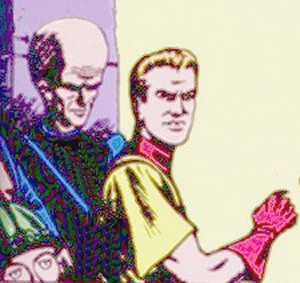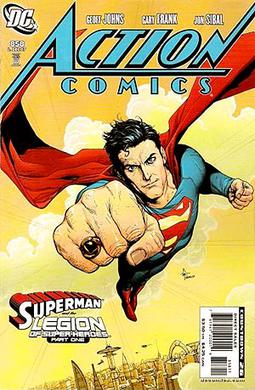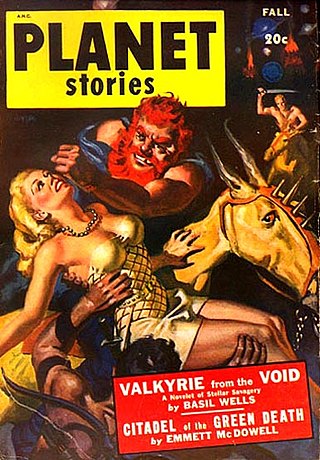
The Illustrated Man is a 1951 collection of 18 science fiction short stories by American writer Ray Bradbury. A recurring theme throughout the stories is the conflict of the cold mechanics of technology and the psychology of people. It was nominated for the International Fantasy Award in 1952.

Murray Leinster was a pen name of William Fitzgerald Jenkins, an American writer of genre fiction, particularly of science fiction. He wrote and published more than 1,500 short stories and articles, 14 movie scripts, and hundreds of radio scripts and television plays.
"Elegy" is the twentieth episode of the American television anthology series The Twilight Zone. It originally aired on February 19, 1960, on CBS. The episode was based on a short story by Charles Beaumont published in the February 1953 issue of Imagination: Stories of Science and Fantasy.

A gravity assist, gravity assist maneuver, swing-by, or generally a gravitational slingshot in orbital mechanics, is a type of spaceflight flyby which makes use of the relative movement and gravity of a planet or other astronomical object to alter the path and speed of a spacecraft, typically to save propellant and reduce expense.

Strata is a 1981 science fiction comedy novel by English writer Sir Terry Pratchett. It is one of Pratchett's first novels and one of the few science fiction novels he wrote, along with The Dark Side of the Sun and The Long Earth which he co-authored.

Fallen Dragon is a science fiction novel by British writer Peter F. Hamilton. It was first published in 2001 by Macmillan. It follows the adventures of the mercenary Lawrence Newton as he attempts to capture what he believes is a fabulous treasure, only to find something of much greater importance.
David Higginbottom was a British author who published under the pen name Nicholas Fisk. He was a writer of science fiction books, mainly for children. His works include Grinny, You Remember Me, Space Hostages, and Trillions. He also wrote the Starstormers series of novels.

The Sands of Mars is a science fiction novel by English writer Arthur C. Clarke. While he was already popular as a short story writer and as a magazine contributor, The Sands of Mars was also a prelude to Clarke's becoming one of the world's foremost writers of science fiction novels. The story was published in 1951, before humans had achieved space flight. It is set principally on the planet Mars, which has been settled by humans and is used essentially as a research establishment. The story setting is that Mars has been surveyed but not fully explored on the ground. The Sands of Mars was Clarke's first published novel.

It Came from Outer Space is a 1953 American science fiction horror film, the first in the 3D process from Universal-International. It was produced by William Alland and directed by Jack Arnold. The film stars Richard Carlson and Barbara Rush, and features Charles Drake, Joe Sawyer, and Russell Johnson. The script is based on Ray Bradbury's original film treatment "The Meteor" and not, as sometimes claimed, a published short story.

Odin: Photon Sailer Starlight, also known as Odin: Starlight Mutiny, is a 1985 Japanese anime film produced by Yoshinobu Nishizaki's West Cape Corporation which was previously known for Space Battleship Yamato. It was directed by Toshio Masuda with a music score by Hiroshi Miyagawa, both of whom worked on the Yamato series.
Commander Perkins is a German science fiction series by H. G. Francis, published partly as audio plays and partly as a series of novels.

Entry to Elsewhen is a collection of science fiction short stories by John Brunner, published in 1972. It contains the following stories:

Chris KL-99 is a 1950s science fiction comic book character whose adventures were published by National Comics, now known as DC Comics. He first appeared in Strange Adventures #1, and was created by science fiction author Edmond Hamilton and artist Howard Sherman.

"Superman and the Legion of Super-Heroes" is a 2007 comic book DC Comics story arc written by Geoff Johns, illustrated by Gary Frank, which features the character Superman and the return of the pre-"Crisis on Infinite Earths" Legion of Super-Heroes. It ran in Action Comics #858–863, this arc marked Geoff Johns' debut as a solo writer on Action, having previously written alongside Kurt Busiek and Richard Donner.
Space Museum was a science fiction comics series published by National Comics in their flagship science fiction title Strange Adventures between 1959 and 1964. The series was written by Gardner Fox and was drawn by Carmine Infantino for almost the whole series.

"Mars Is Heaven!" is a science fiction short story by American writer Ray Bradbury, originally published in 1948 in Planet Stories. "Mars Is Heaven!" was among the stories selected in 1970 by the Science Fiction Writers of America as one of the best science fiction short stories published before the creation of the Nebula Awards. As such, it was published in The Science Fiction Hall of Fame Volume One, 1929–1964. It also appears as the sixth chapter of The Martian Chronicles, revised as "The Third Expedition."

Ancient astronauts have been addressed frequently in science fiction and horror fiction. Occurrences in the genres include:

Kingdoms of the Wall is a 1992 science fiction novel by American writer Robert Silverberg. It is set on a faraway planet inhabited by an alien race and in an undefined future. Its subject is the perpetual communal quest for knowledge in the face of hardship and wonders, which through the revelation of an unexpected and devastating truth results in the deconstruction and slaying of gods.

Five Against Venus, written by Philip Latham, is a science-fiction novel first published in the United States in 1952 by the John C. Winston Company. Philip Latham was the nom de plume of Robert S. Richardson, a professional astronomer who also provided technical assistance on movies such as Destination Moon and wrote scripts for the Captain Video television series.
Men of the Ten Books is a science fiction story by Jack Vance published in 1951. Also titled The Ten Books, it is about a new society on a distant Earth-like planet founded by the inhabitants of a huge intergalactic spaceship of colonists which crash-landed there. The survivors only manage to rescue a single set of books from the wreckage: an inexpensive set of encyclopaedias. Their entire knowledge of Earth’s culture and history is based on the glowing, puffery-filled descriptions in these books, which leads them to revere Earth as a perfect world.














